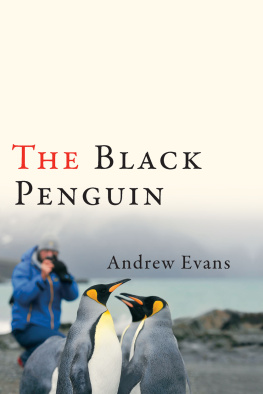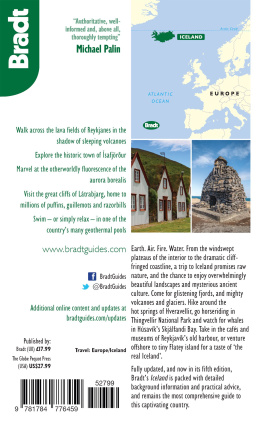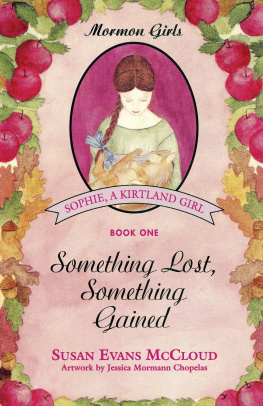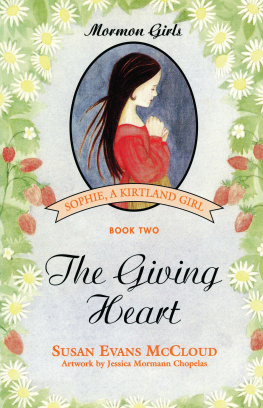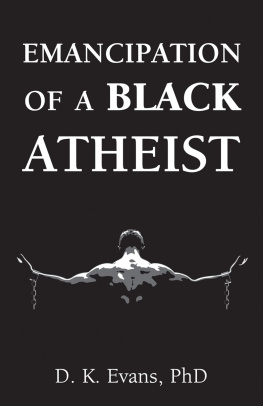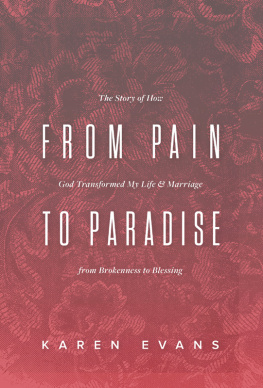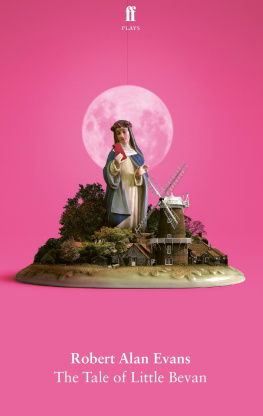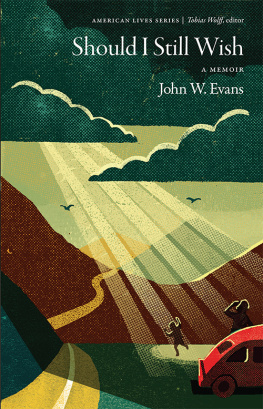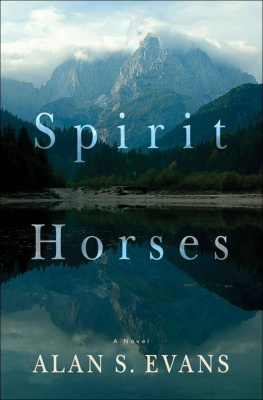LIVING OUT
Gay and Lesbian Autobiographies
David Bergman, Joan Larkin, and Raphael Kadushin
SERIES EDITORS
Publication of this volume has been made possible, in part, through support from the Brittingham Fund.
The University of Wisconsin Press
1930 Monroe Street, 3rd Floor
Madison, Wisconsin 53711-2059
uwpress.wisc.edu
3 Henrietta Street, Covent Garden
London WC2E 8LU, United Kingdom
eurospanbookstore.com
Copyright 2017
The Board of Regents of the University of Wisconsin System
All rights reserved. Except in the case of brief quotations embedded in critical articles and reviews, no part of this publication may be reproduced, stored in a retrieval system, transmitted in any format or by any meansdigital, electronic, mechanical, photocopying, recording, or otherwiseor conveyed via the Internet or a website without written permission of the University of Wisconsin Press. Rights inquiries should be directed to .
Printed in the United States of America
This book may be available in a digital edition.
Library of Congress Cataloging-in-Publication Data
Names: Evans, Andrew, 1975 author.
Title: The black penguin / Andrew Evans.
Other titles: Living out.
Description: Madison, Wisconsin: The University of Wisconsin Press, [2017] | Series: Living out: gay and lesbian autobiographies.
Identifiers: LCCN 2016041573 | ISBN 9780299311407 (cloth: alk. paper)
Subjects: LCSH: Evans, Andrew, 1975 Travel. | Voyages and travels. | LCGFT: Travel writing.
Classification: LCC G465 .E835 2017 | DDC 910.4092 [B]dc23
LC record available at https://lccn.loc.gov/2016041573
Soul Meets Body, words and music by Benjamin Gibbard, copyright 2005 EMI Blackwood Music Inc. and Where Im Calling From Music. All rights administered by Sony/ATV Music Publishing LLC, 424 Church Street, Suite 1200, Nashville, TN 37219. International Copyright Secured. All Rights Reserved. Reprinted by Permission of Hal Leonard Corporation.
Bus to Baton Rouge, words and music by Lucinda Williams, copyright 2001 Warner-Tamerlane Publishing Corp. All Rights Reserved. Used by permission of Alfred Music.
ISBN 978-0-299-31148-3 (electronic)
For
MY FAMILY,
near and far
Cause in my head theres a Greyhound station
Where I send my thoughts to far off destinations
So they may have a chance of finding a place
Where theyre far more suited than here.
BEN GIBBARD (Death Cab for Cutie), Soul Meets Body
Preface
On the sunny morning of January 1, 2010, I stepped onto a city bus in Washington, DC, and set off for the end of the world.
Up until then, all my grown-up attempts to reach Antarctica had failedthe formal grants and scientific missions, every expedition I hoped to join, and the exotic support jobs I applied for over and over in vain. I thought it totally unfair that such a glaring and prominent section of the globe would prove so elusive to someone like me.
Discovering that one is merely average is troubling, but I responded in kind, with my own average measures. If fate had refused me the chance to reach Antarctica, then I would invent my own opportunity, getting as close as possible to my dream with the everyday means available to me.
I had no car, nor did I have any money, but I had the bus. I had been riding buses since kindergartenit is the simplest and most accessible form of public transportation that exists. If I could just keep connecting from one bus to the next, then eventually I would reach the bottom of the world.
My rules were simple: take the nearest bus to the farthest point south, then hop on the next one, and another after that. I traveled this way for over ten thousand mileswithout any planned route and without any advance tickets. When I felt too tired to go on, I took a break. Sometimes I checked into hotelsto sleep, to wash, and to write. Sometimes I rode the bus all night long and all the next day. Occasionally I cheated: a taxi to the border post, a lift with the milkman, a boat through the Panama Canal, and a twenty-minute plane ride over the impassable jungle.
For me, the gift of overland travel was the joy of gradual transition: from swamp to desert, from mountain to prairie. Taking the bus allowed me to feel the latitudes of Earth in a way that is lost by those who merely jet set from A to B.
Social media let me share my observations from the road in real time. At the time, Twitter was enough of a novelty that my editor assigned me a feature for National Geographic Traveler magazine. The formal assignment helped secure my final passage to Antarctica on the Lindblad Expedition ship, the National Geographic Explorer.
My original Bus2Antarctica story was told from the road in the form of sixty-four blog posts, a dozen videos, and over five thousand tweetsbut even the culminating magazine feature felt inadequate and limited. How do you squeeze a life-changing adventure into a few colored pages? What about the ups and downs of travel, the many hours spent staring out the window, and this odd compulsion to ride buses to the bottom of the world? Some stories cannot fit into a tweet, and others get only half-told, but for those who cared and asked, this book details my epic bus ride across the world, and the even longer story as to why.
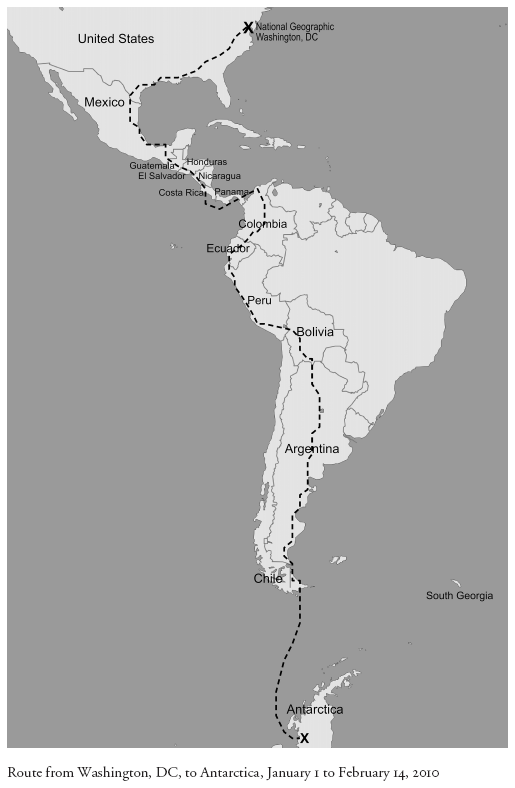
1
COLD PITCH
Fall 2009
Nice office!
The words left my mouth too soonI was just a desperate boy, giddy and overflowing, screaming for attention. Mine was a miscalculated attempt to seem cool and familiar in front of a man I respected, but instead I sounded lousy and pedestrian, like a redneck reality star wooed by fancy drinks. My first five seconds with Keith Bellows and he was already frowning back at me.
Though I had meant what I saidKeiths office was nice. It was the type of corner office I had dreamed I would end up in someday. Glass walls framed the scene of M Street below with the editor in chief posed behind his desk, commanding the editorial spaceship from his fourth-floor cockpit. Travel flotsam cluttered the inside walls and floor, hiding the sleek and minimalist architecture with dyed Berber rugs shipped back from Morocco, rough-hewn ebony stools from Africa, dainty parasols of painted Chinese silk, and a coffee table fashioned from a lightning-split log. A well-used globe, just like the one in my childhood bedroom, sat next to a laden set of stained wooden bookshelves stacked with leathered volumes.
Keith caught me gawking and locked eyes with me, leaning forward. He looked exactly like his head shot in the front of the magazine, except that he was taller and more imposing with a deep tan and an unbuttoned collar that showed he really didnt give a damn. There was paper everywherefinished stories and story ideas; colored proofsneeding to be signed off; and outdated foreign-language issues, destined never to be read.
What can we do for you? he asked, straight to the point. No. This would not be a thirty-minute meeting or even a fifteen-minute meeting. It was a five-minute meeting tops, and if I blew it now, there would be no meeting. There was no time for my detailed synopsis of my lifelong obsession with National Geographic and how I was more deserving than the rest.
I want to write for you, I announced point-blank. If Keith could be direct then so could I, though I guessed he had heard that line before. Alas, my direct approach failed to impress and by the look on his face, I imagined he was searching for a small red button to push that would open a hatch and shoot me down into some undisclosed basement where I would be added to the societys secret collection of shrunken heads.

